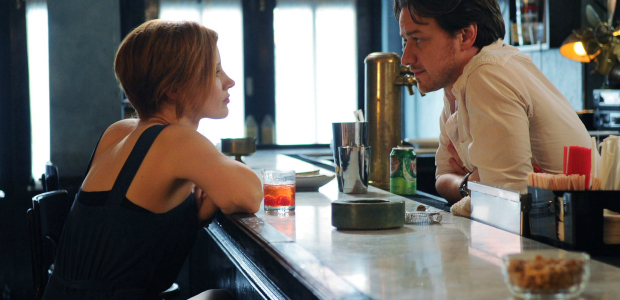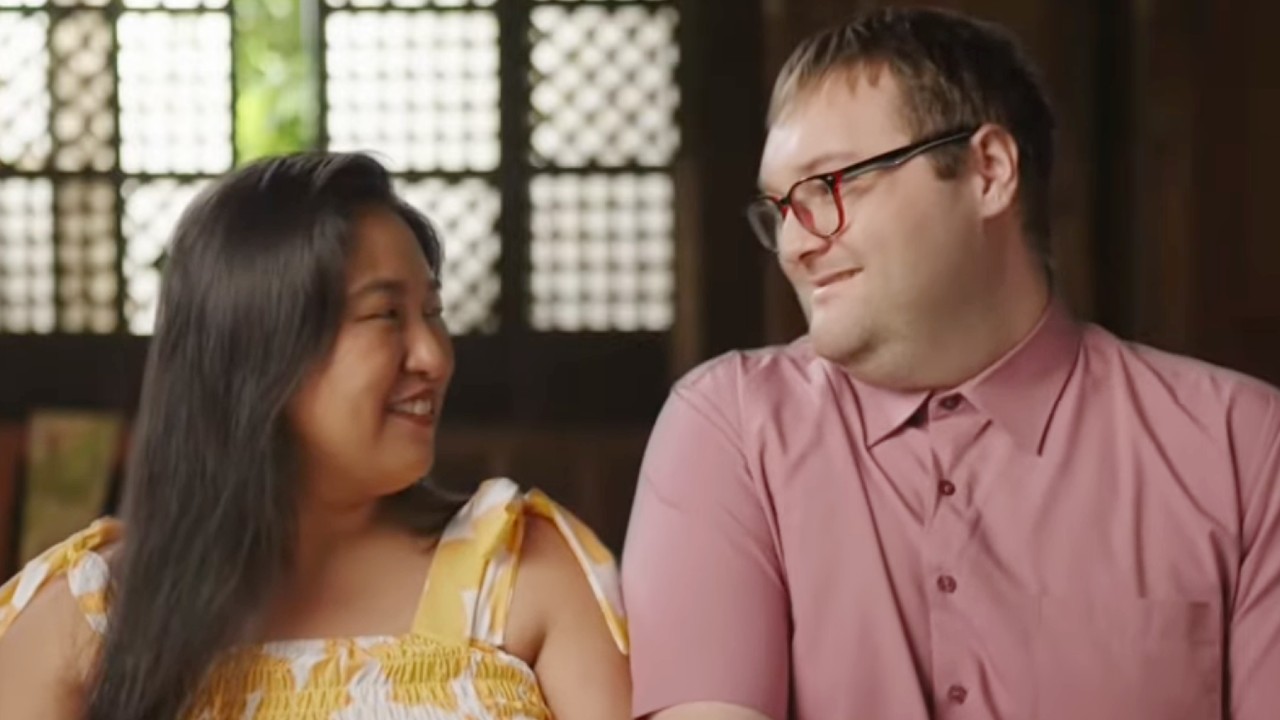Writer-director Ned Benson makes his feature film debut in a dizzying manner, spinning one story into three films: The Disappearance of Eleanor Rigby: Him, The Disappearance of Eleanor Rigby: Her, and The Disappearance of Eleanor Rigby: Them. The first two screened at the Toronto International Film Festival in 2013 as works in progress. The third premiered at Cannes earlier this year. But watching The Disappearance of Eleanor Rigby: Them, it's confounding to imagine that two more films could be cobbled out of such a paper-thin plot.
This triptych of cinema centers on the highs and lows in the marriage of Connor Ludlow (James McAvoy) and Eleanor Rigby (Jessica Chastain). We're introduced to this couple in the middle of a reckless night out in Manhattan, where the two have just finished a seemingly expensive meal that they have no means to pay for. (Whether they've forgotten wallets or are flat broke is never addressed.) After some juvenile dine-and-dashing, these thirty-somethings find themselves giggling on the grass of a deserted park. Amid the fireflies, they cuddle and coo. Hard cut to daytime, where a clearly distraught Eleanor stumbles along the Brooklyn Bridge before throwing herself off it.
How we got from this blissful summer buzz to a suicide attempt and how these broken lovers move on after it, is at the center of this drama. Unfortunately, the puzzle pieces Benson picks for this endeavor offer too little to lock into.
I imagine the concept of the original two films is to provide a sort of Rashômon or he-said/she-said narrative, where the story changes depending on its teller's perspective. I haven't seen Him or Her. Based on Them I have no intention to. The Disappearance of Eleanor Rigby: Them seems to attempt the same conflict in storytelling with a shorter running time. However, Eleanor's plotline and perspective dominate the film.
She's given far more screen time than her husband, which makes sense as she is the more proactive protagonist of the pair. Eleanor goes from suicide attempt to an earnest search for her own identity apart from her partner. She attends university classes and finds a mentor and friend in a cynical yet caring professor (a vibrant and razor-sharp Viola Davis). She strives to heal herself through conversations with her family. Connor ignores his father, sulks in his failing restaurant, then begins stalking his wife, who clearly wants her space.
I suspect Benson wants audiences to be torn over who to side with in this battle of could-be exes, as Broken Circle Breakdown, Blue Valentine, and The One I Love have done. But the scraps of scenes he offers are disjointed, making this narrative's unfolding feel like half-heard conversations in a crowded coffeehouse. How can we be invested enough to pick a side, when neither one feels fleshed out? Further stunting this conceptually interesting drama is dialogue that is pretentious and overwrought. Characters speak in pretty but nonsensical poetry and metaphors that mean nothing. "Tragedy is a foreign country," a desperate dad tells his heartsick daughter, "We don't know how to speak to the natives." Later, a randy bartender blurts out, "We live in a world full of probablys!" Viewers are not the only ones perplexed by these meant-to-be witty one-liners. Characters within the film occasionally demand clarification, or ask flat out if what they are saying makes any sense. (Too often the answer is no.) Basically, this dialogue is of the level I imagine from every sneering screenwriter crouched over his latte and keyboard at Starbucks.
Too often, Benson indulges an urge to have his promising cast--which also includes William Hurt, Ciaran Hinds, and Isabelle Huppert--wax on in lengthy monologues. I counted at least five in the course of the film. In and of themselves, they could have offered great actors a meaty moment to sink their teeth into. But all together it becomes exhausting and trite as one parent (or parent figure) after another doles out lengthy advice through long personal anecdotes.
Your Daily Blend of Entertainment News
I wish I could say the performances herein save The Disappearance of Eleanor Rigby: Them from Benson's vain indulgences. But this movie feels more like an actor's reel than a cohesive narrative. Chastain's performance is committed and free of vanity, as she allows herself to be seen in eternally smudged eye makeup and ill-fitting active wear. Her chiseled countenance and pained eyes do bring some depth to her underwritten (or perhaps under-shown) role, and she shares a jagged heat with McAvoy in their rare moments together. For his part, McAvoy's otherwise competent portrayal is marred by a bizarre American accent. There's just something about it that rings false and is thereby distracting. No established reason is given as to why Connor couldn't have been Scottish. As the movie went along with vowels clanging with a crudely faked American tone, I wish Benson had just allowed McAvoy to live in his own voice.
The Disappearance of Eleanor Rigby: Them wants to be challenging and unique. It's loose-limbed structure of focus shifts and flashbacks as well as its resistance to easily allow us into Eleanor and Connor's conflict makes that much clear. Sadly, Benson ran before he could walk. The result is a film that's aim surpasses its reach by an embarrassing measure. It's cluttered with clichés, from a French mom never without a glass of wine to the goofball confidante (Bill Hader straight out of a jaunty rom-com), and un-ironic Star Wars quoting ("I love you." "I know.") Rather than breaking new ground in the romantic drama genre, Benson offers a jumbled tale that feels narratively lacking and emotionally shallow. By the time it tumbles into its saccharine and overlong resolution, you'll be stuck wondering what scenes from the other two movies might have made Them come together better. But after this boorish endeavor, it's a question I'd rather forget than bother exploring.
Regardless of its origins or alternate incarnations, The Disappearance of Eleanor Rigby: Them should be able to work as its own film, independent of its predecessors. But without its curious backstory, it is little more than a mediocre romantic drama with a noteworthy cast.
Staff writer at CinemaBlend.


